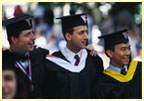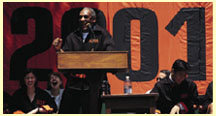|
July 4, 2001 Features
Commencement 2001
Princeton's 254th commencement ceremony, on a sunny June 5, had an abundance of Princeton tradition - distinguished processionals, speeches that extolled the bright minds of its students as well as their promising futures, thousands of proud parents, and 1,732 robed students, undergraduate and graduate - but it also showcased the unexpected. Salutatorian Christopher Bradley, as he took the podium to deliver his Latin oration, put a crown of leaves on his head and unzipped his robe to show off a homemade toga. On behalf of the trustees, Robert H. Rawson, Jr. '66, chair of the trustees' executive committee, conferred a surprise honorary degree and a big hug on Shapiro during his last commencement as president of Princeton. And for the first time in Princeton's history, two valedictorians addressed their class. After the president welcomed the graduates and invited them to applaud their parents and families, Bradley, a classics major, unveiled his toga and addressed his classmates in Latin. He encouraged them to serve all nations and remember that "non omnes viae ad semitam muralem tendunt" - despite appearances, all roads do not lead to Wall Street. As his fellow Princetonians embark on careers, he said he hopes "we will take with us not superior erudition . . . but rather an ability to think critically and carefully about the world around us, and about ourselves." Valedictorian Jared Kramer, an engineering student, quoted Thomas Aquinas: "The intellect is what moves all the parts of man" and reason is the "first principle of human action." To live productive lives, said Kramer, "we need knowledge. We also need moral truth." And he implored his classmates to continue questioning and exploring rigorously. "Ask questions of moral justification. Be critical of your institutions and leaders," he said. "Approaching our beliefs, our theories, and the way the world works with doubt and with reason liberates us to make the best use of all that was given to us in four years at Princeton." An award-winning pianist and a physics major, Valedictorian Christine McLeavey reflected on a piano piece, an impromptu by Franz Schubert that she learned to play under the tutelage of pianist Theodore Lettvin, and the lessons on life that both the piece and her teacher imparted. Through Lettvin, she learned about the "ability to see beauty and potential for beauty in every person, the same way Ted saw potential for beauty in every phrase printed on a sheet of music paper. It's an ability that doesn't come with coursework and studies and isn't measured in grades and paychecks." And she encouraged her classmates to slow down enough to commit themselves to an idea, to an emotion, and to their own beliefs. "We all have the chance to stand for what we believe, to see the beauty in life and not to worry what others will think." President Shapiro conferred degrees on 921 bachelors of arts and 163 bachelors of science in the Class of 2001, and upon seven graduates of earlier Princeton classes. He also conferred 648 advanced degrees. In concluding the ceremony, President Shapiro reflected on Princeton experiences he's had as president and the changes he has overseen. And he emphasized his belief in building on tradition but also working "on behalf of new ideas and innovative programs." After thanking, among other people, the trustees, "for having enough faith in me, not only to elect me as president, but to support the many initiatives we have undertaken together in the last 14 years," he reminded the graduating seniors of their moral responsibility as educated citizens and that "for those who have had the benefit of a Princeton education, the responsibilities are greater still." He closed with the same Celtic blessing he recited at the first commencement address he gave as a university president 22 years ago: May the road rise to meet you. May the wind always be at your back . . . And, until we meet again, May God hold you in the palm of his hand. By K.F.G.
Class Day a class act
An emotional seesaw marked Class Day on June 4, as seniors heard humorous advice from the event's first non-university speaker - comedian Bill Cosby - and made symbolic amends for a low point in Princeton history in honoring retired New York Supreme Court Justice Bruce M. Wright. Wright was admitted to Princeton in 1935. But because he is black, he was not welcomed on arrival and was sent home. He graduated from Lincoln University, a traditionally black school founded by Princeton alumni, and earned a law degree from New York Law School in 1950. His career has included judgeships in criminal and civil court, election to New York's State Supreme Court, and the authorship of several books. In a poignant introduction before naming Wright an honorary member of the class, Theodore Nemeroff '01 asked seniors to "reflect on our legacy as an institution and the injustices that Princeton has committed, so that we may make it a better place for people of all backgrounds in the future." Cosby, also made an honorary class member along with President Shapiro and incoming president Shirley M. Tilghman, suggested seniors shouldn't worry about their futures: "You'll get the message. You'll get the signal. You'll be proud of the work you were forced to do while you were here because it's going to show up once you decide to apply yourself to what you want to do." Cosby played for laughs in his off-the-cuff address, but the last joke was on him. After he poked good-natured fun at Adam Rubin '01's comments on hauling home laundry, it was Cosby who ended up cluthing a clothes pile - a class beer jacket, Princeton sweats to commemorate his track-and-field days, a football jersey with his playing number - 33 - and a varsity jacket. "Anybody else need laundry done?" he quipped. By Maria LoBiondo Class Day awards The Class Day Awards honor students for outstanding accomplishments and service. The Class of 1901 Medal, for the senior who "has done the most for Princeton" went to P. J. Kim of Wyomissing, Pennsylvania, who was president of the Undergraduate Student Government. The W. Sanderson Detwiler 1903 Prize for the senior who "has done the most for the class" went to Justin Browne of Dunwoody, Georgia, who is president of the senior class. Aime Scott of Ferndale, Maryland, and John Dabiri of Toledo, Ohio, shared the Harold Willis Dodds Award, which is given to the senior who best embodies the example set by the 15th president of Princeton, "particularly in the qualities of clear thinking, moral courage, a patient and judicious regard for the opinion of others, and a thoroughgoing devotion to the welfare of the university and the life of the mind." The Frederick Douglass Service Award was shared by Theodore Nemeroff of Bethesda, Maryland, and P. J. Kim. The Allen Macy Dulles '51 Award for service went to Roberta Stennet of Mandeville, Louisiana, and Seth Green of Coral Springs, Florida. Abigail Love of Lander, Wyoming, received the Priscilla Glickman '92 Memorial Prize, which honors "independence and imagination in the area of community service." Honorary Degree Recipients President Shapiro and President-elect Shirley Tilghman are flanked by the honorary degree recipients: from left, Sonia Sotomayor '76, William Russell, Jane Lubchenco, Kevin Gover '78, Spike Lee, Aaron Lemonick *54, Courtland Perkins. (ricardo barros)
Kevin Gover '78, Doctor of Laws Attorney specializing in federal law relating to Indians and Indian tribal law As an undergraduate, Gover marched on campus with placards drawing attention to the plight of the American Indian. Later, as assistant secretary for Indian Affairs in the Department of the Interior, he oversaw the operations of the bureau's programs, including those related to recognition, trust assets, self-determination, water rights, tribal courts, and education.
Shelton Jackson "Spike" Lee, Doctor of Fine Arts Filmmaker, actor, and writer Lee's films have been praised for intelligently and sensitively capturing relationships in American society, among African Americans and between African Americans and whites. His work shows that silence about racial or personal differences is divisive, and that communication, even about painful issues, can build a united nation.
Aaron Lemonick *54, Doctor of Science Professor of physics, emeritus, Princeton University In 1961, Lemonick came to Princeton as an associate professor in physics and as associate director of the Princeton-Pennsylvania Accelerator. He became dean of the Graduate School in 1969, and in 1973 he was named dean of the faculty, a position he held until 1989. He is a winner of the President's Distinguished Teaching Award. More recently, he has helped local elementary school teachers develop creative methods to teach science.
Jane Lubchenco, Doctor of Science Environmental scientist and marine ecologist, Oregon State University Lubchenco has gained an international reputation for her efforts to increase understanding of the natural dynamics of the Earth's ecosystems. Called a visionary leader in the international scientific community, she has been one of the most influential voices for science and science policy in our nation and the world.
William Felton Russell, Doctor of Humanities Former professional basketball player and a member of the board of the National Mentoring Partnership As a basketball star for the Boston Celtics, Russell revolutionized the role of defense in basketball. Elected an NBA All-Star 11 times, five-time winner of the Most Valuable Player Award, he has also gained recognition for his successful efforts to break racial barriers in sports and win equality for African Americans. He was the first African American to coach a major league professional team.
Courtland D. Perkins, Doctor of Science Professor of aerospace and mechanical engineering, emeritus, Princeton University Perkins joined the faculty in 1945 to head up a fledgling program in flight test engineering and stayed until he retired in 1978. His pioneering text on aircraft stability and control laid the groundwork for scientifically testing the limits of flight in air and space. As engineer, teacher, administrator, and adviser, he has inspired students who have advanced the frontiers of knowledge, captained the aerospace industry, and planted Princeton's flag on the moon.
Sonia Sotomayor '76, Doctor of Laws Judge on the U.S. Court of Appeals for the Second Circuit In 1992, after a decade as an attorney, Sotomayor was appointed district judge for the Southern District of New York. In 1998 she moved to the U.S. Court of Appeals. Her decisions include a 1995 injunction that ended an impasse between baseball owners and players, a reinterpretation of copyright law in the context of new media, and rulings in favor of public access to private information and in defense of religious freedom. Prairie postscript Garrison Keillor, author and raconteur, spoke at this year's baccalaureate service. In his talk he urged seniors to take risks and have fun. "Today's grievous mistake is tomorrow's humorous anecdote," he said. "I think you should all go out and have a beautiful life that includes adventure and romance and some failure and misery, and certainly some remorse." Keillor told students to avoid comparing themselves to others and to allow themselves to make mistakes. An unquestioning and safe pursuit of possession and status is a recipe for a mid-life crisis, he said. He urged students to get their midlife crises over with in their 20s rather than their 40s. Princeton's baccalaureate address is one of the university's oldest traditions; the first was delivered in 1760 by President Samuel Davies to the 11 members of the graduating class and was called "Religion and Public Spirit." |
|||






 Comedian
Bill Cosby, top, wows seniors at Class Day. (Photo: Ricardo Barros)
Comedian
Bill Cosby, top, wows seniors at Class Day. (Photo: Ricardo Barros)